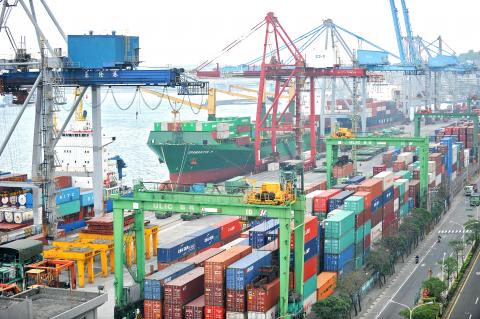Taiwan’s exports rose 21.8 percent from a year earlier to US$24.37 billion last month on demand from China, the US and Europe ahead of Christmas and the Lunar New Year, the Ministry of Finance said yesterday.
It was the third-highest value ever, with exports to Europe increasing 27.8 percent on a yearly basis to a new record of US$2.95 billion despite lingering debt problems there, the report said.
For the first 11 months, exports increased 36.6 percent to US$250.81 billion and are set to exceed the US$272.7 billion level for the whole of this year that the Directorate-General of Budget, Accounting and Statistics (DGBAS) forecast last month, Lin Lee-jen (林麗貞), head of the ministry’s statistics department, said at a news conference.

PHOTO: AFP
“Exports this quarter will outperform the third quarter as demand for consumer electronics remains strong amid the region’s fast-growing economies,” Lin said.
Shipments of electronics gained 16.4 percent yearly to US$6.75 billion last month, while those of base metals and related products increased 25.9 percent to NT$2.27 billion, the report showed.
Imports jumped 33.8 percent year-on-year to US$23.96 billion last month with capital goods contributing US$4.4 billion, suggesting active expansions on the part of the private sector, Lin said.
The latest trade figures translated into a trade surplus of US$410 million, the lowest since the global financial crisis in 2008, due to the import of three aircraft, Lin said, dismissing links with foreign exchange rates.
The New Taiwan dollar weakened NT$0.22 against the US currency last month from October, she said.
Shipments to China including Hong Kong picked up 18.2 percent yearly to US$9.83 billion last month, while exports to the US increased 32.1 percent to US$2.96 billion, the report said.
Exports to Southeast Asian countries gained 15.8 percent to US$3.53 billion last month, while those to Japan grew 12.3 percent to US$1.57 billion, the report said.
The rosy trade data is likely to encourage the central bank to hike interest rates in its quarterly board meeting later this month to cushion inflationary pressure, said Tony Phoo (符銘財), an economist at Standard Chartered Bank Taiwan Ltd (渣打銀行).
“The central bank will likely raise the interest rate by another 12.5 basis points as Taiwan’s real interest rate was in negative territory last month,” Phoo said.
The nation’s consumer price index rose 1.53 percent last month from a year earlier, DGBAS reported on Monday, while the one-year time deposit rate is currently 1.13 percent at Bank of Taiwan (臺灣銀行).
Donna Kwok (郭浩莊), an economist on Greater China at HSBC, however, said the central bank is likely to halt the interest normalization cycle this month with the NT dollar still under appreciation pressure.
“We expect the central bank to keep its policy rate frozen,” Kwok said in a note. “With the formation of new headwinds in Europe and the negative turn in the US labor market, the outlook for Taiwanese exports is gloomier than in September.”

RECYCLE: Taiwan would aid manufacturers in refining rare earths from discarded appliances, which would fit the nation’s circular economy goals, minister Kung said Taiwan would work with the US and Japan on a proposed cooperation initiative in response to Beijing’s newly announced rare earth export curbs, Minister of Economic Affairs Kung Ming-hsin (龔明鑫) said yesterday. China last week announced new restrictions requiring companies to obtain export licenses if their products contain more than 0.1 percent of Chinese-origin rare earths by value. US Secretary of the Treasury Scott Bessent on Wednesday responded by saying that Beijing was “unreliable” in its rare earths exports, adding that the US would “neither be commanded, nor controlled” by China, several media outlets reported. Japanese Minister of Finance Katsunobu Kato yesterday also

Taiwan’s rapidly aging population is fueling a sharp increase in homes occupied solely by elderly people, a trend that is reshaping the nation’s housing market and social fabric, real-estate brokers said yesterday. About 850,000 residences were occupied by elderly people in the first quarter, including 655,000 that housed only one resident, the Ministry of the Interior said. The figures have nearly doubled from a decade earlier, Great Home Realty Co (大家房屋) said, as people aged 65 and older now make up 20.8 percent of the population. “The so-called silver tsunami represents more than just a demographic shift — it could fundamentally redefine the

China Airlines Ltd (CAL, 中華航空) said it expects peak season effects in the fourth quarter to continue to boost demand for passenger flights and cargo services, after reporting its second-highest-ever September sales on Monday. The carrier said it posted NT$15.88 billion (US$517 million) in consolidated sales last month, trailing only September last year’s NT$16.01 billion. Last month, CAL generated NT$8.77 billion from its passenger flights and NT$5.37 billion from cargo services, it said. In the first nine months of this year, the carrier posted NT$154.93 billion in cumulative sales, up 2.62 percent from a year earlier, marking the second-highest level for the January-September

‘DRAMATIC AND POSITIVE’: AI growth would be better than it previously forecast and would stay robust even if the Chinese market became inaccessible for customers, it said Taiwan Semiconductor Manufacturing Co (TSMC, 台積電) yesterday raised its full-year revenue growth outlook after posting record profit for last quarter, despite growing market concern about an artificial intelligence (AI) bubble. The company said it expects revenue to expand about 35 percent year-on-year, driven mainly by faster-than-expected demand for leading-edge chips for AI applications. The world’s biggest contract chipmaker in July projected that revenue this year would expand about 30 percent in US dollar terms. The company also slightly hiked its capital expenditure for this year to US$40 billion to US$42 billion, compared with US$38 billion to US$42 billion it set previously. “AI demand actually